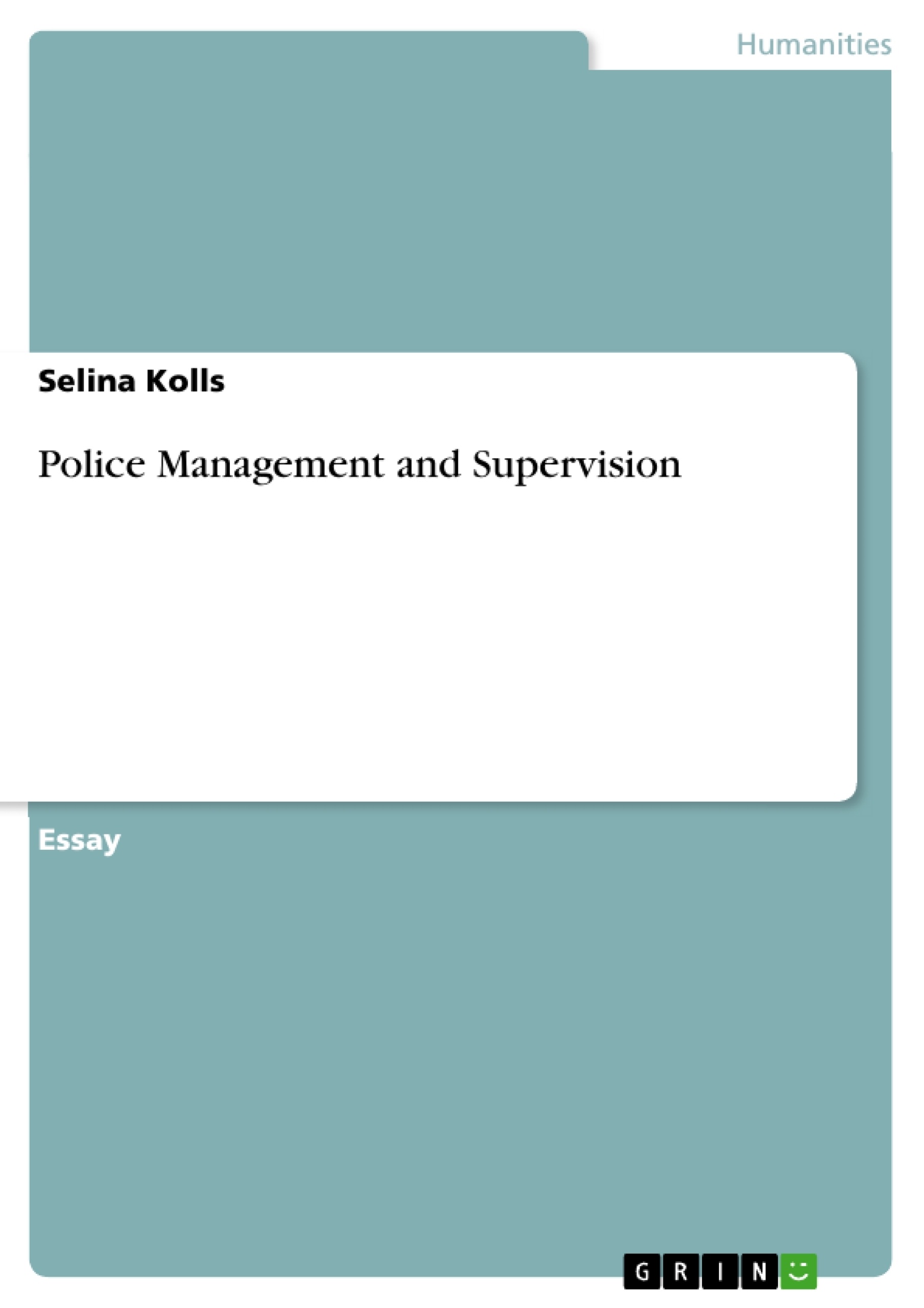Excerpt
2
interact with their team members. Although police leaders are not always entrusted with the
responsibility to oversee the performance of others, they do influence the actions of their
team members in line with organizational objectives. Police supervisors, unlike leaders, are
tasked with the responsibility of helping their subordinates set goals and develop strategies to
achieve these goals; directly influencing their performance in the process.
At this point, it becomes palpable that both police leaders and supervisors inspire and
motivate police at all levels to act in a way that benefits them and their company. I strongly
support the idea that you cannot be a good police supervisor and a bad leader. For a police
supervisor to get the performance he or she desires, he or she has to possess the ability to
influence and motivate his or her team members to cooperate and yield their best
performance; which basically depends on a supervisor's leadership qualities. Good police
supervising leaders are more expected to inspire their subordinates to give the finest, not like
those supervisors lacking worthy leadership skills and therefore have to depend on the power
derived from their positions in their organizations (Whisenand and McCain, 2015). Hence,
you cannot be a good supervisor and a bad leader all at once. Alternatively, you cannot be a
good police leader but a bad supervisor for the reason that as a good leader, you will be in
possession of positive leadership traits; the elements that make you a good supervisor!
Therefore, I am of the opinion that a good police leader can double-up as a good police
supervisor because both professions warrant the possession of good leadership skills for the
leadership practices to be considered "effective."
Question 2
It is the opinion of Whisenand and McCain (2015) that organizational leaders are
expected to be perfect. The fact is that in reality, you can be a professional at one particular
3
area only despite the array of academic qualifications. That is your strength. However, we do
have weaknesses too. As a leader, you also have your weaknesses. The option of whether to
employ a strength-based leadership approach or a weakness-based approach in your
leadership approach depends on your liking. I am of the opinion that an excessing strengths
approach is more beneficial than the excessing weakness approach. The clarification of my
thinking is that once a police leader knows his and his team's strengths, he can invest in other
people's strengths by delegating responsibilities. Additionally, a police leader that clearly
understands his strengths and weaknesses can get the right people on his team because he
knows exactly what he wants in them. This improves the selection method (Whisenand and
McCain, 2015).
Furthermore, a strength-based leadership approach inspires creativity and innovation
among team members because of passing on responsibilities to team members. The only
drawback with this leadership approach is that it only focuses on the strengths and not
weaknesses. Consequently, the performance, skills, or knowledge gaps that may exist in an
organization are ignored. The end result of such an error is that the team members'
development process can grind to a halt because of a weakness that has never been
diagnosed. For instance, a marketing manager can over emphasize on the educational
adeptness of his team members, but overlooks the idea of coaching them on how to make
effective selling presentations. Such a team will excel theoretically, but will miss the mark
when it comes to securing deals because of ineffective presentations. In the long run, such a
team will fail because the manager did not factor in all the elements of success.
On the other hand, you can choose to employ a weakness-based leadership approach.
The police leader, in this approach, focuses on improving the weaknesses of his team
members. Therefore, it is the duty of the police leader to instill the desired work decorum in
his team. This approach is not as beneficial as the strength-based approach because it is often
4
costly to train the team members. Additionally, the process of improving on team members'
weaknesses can lead to loss of motivation in weaker team members. Frail team members can
feel picked-on whenever they do not grasp one or two work related concepts. It is benign to
argue that this potentially damages the motivation of police, negatively affecting their
performance. Thus, I can confidently state that a strength-based leadership approach is more
advantageous because it offers more benefits to the management of police when compared to
an excessing weakness approach.
Question 3
According to my perception of management, I can define a manager as an individual
that is responsible for the administering of all or part of a company. To me, being a manager
means making the necessary decisions regarding the planning, controlling, organizing, or
staffing of an organization. The specific traits of a good police manager are: good
communicator, ethical, fact decision maker, trustworthy, critical and creative thinker,
emotional stability, self-assurance, enthusiasm, and fast problem solver. I would argue that a
transformational style of leadership is the best. The police leader, employing a
transformational leadership approach, emphasizes on the worth of attaining organizational
goals, then mobilizes the efforts of his subordinates to implement change, and then sets a
moral example that builds further on the professional ethical motives of other police. All the
items of discussion in this essay are my points of perspective.
5
References
Whisenand, P. M., & McCain, E. D. (2015). Supervising police personnel: Strengths-based
leadership (8th ed.). Upper Saddle River, NJ: Prentice Hall
Excerpt out of 5 pages
- Quote paper
- Selina Kolls (Author), 2016, Police Management and Supervision, Munich, GRIN Verlag, https://www.grin.com/document/337844
Publish now - it's free
✕
Excerpt from
5
pages






















Comments